- Points Based
- Most people below the age of 51 years old, with an occupation (listed on each country’s list), 2+ years of work experience & good English / French are eligible for this
- It is the most popular way of settling overseas
- Similar to skilled immigration
- Occupation must be listed on the state list
- Long term visa converted to PR & citizenship
- Very popular option for most countries
- Candidates who find a full time job & an employer overseas are eligible for this visa
- test
Y-Axis offers job search services to help candidates market themselves to overseas employers. We have a high success rate & have been very successful with this. For more information, please click here.
- Some countries offer permanent residency anyone who has a parent, brother, sister, uncle, aunt or first cousin overseas
- The sponsoring relative needs to be an citizen or a permanent resident of that country
- test
- Many countries offer a temporary or PR visa in exchange for an investment
- Investment amounts can range from $50,000 to $500,000 or more
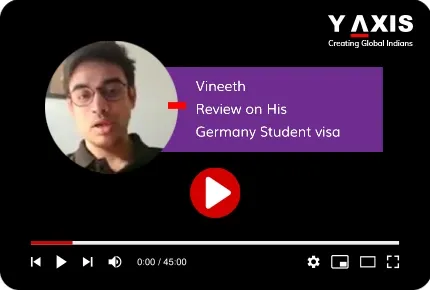

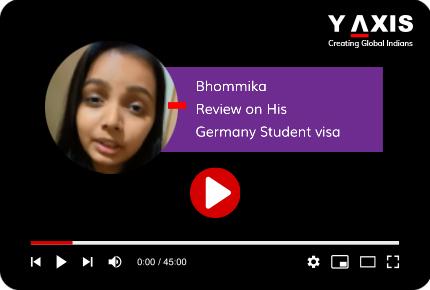
Masters in Germany, Top universities in Germany for masters, MS in Germany, top universities in germany for ms, MS in Germany for Indian students, Masters in Germany for Indian students, Masters in Germany cost, MS in Germany cost, Best universities for masters in Germany, Top universities for masters in Germany, Universities in Germany for masters, Universities in Germany for MS, Study MS in Germany, Study masters in Germany, MS courses in Germany, Masters courses in Germany, Masters degree in Germany for international students, Germany masters fees, MS colleges in Germany, Masters courses in Germany, Best colleges in Germany for MS, Best college in Germany for masters, Germany masters fee
Want to study MS in Germany? Explore the best universities for master’s degrees, including top programs, rankings, admissions, and scholarships.
Masters in Germany: Top Universities, Courses, Fees, Eligibility & More
Germany has become a top choice for students who want to pursue an MS in Germany or a master’s degree. Renowned for its high-quality and affordable education, German universities often charge low or no tuition fees, especially in areas like engineering, technology, and business.
This makes Germany an attractive destination for international students. Those planning to study an MS in Germany should be aware of the specific MS in Germany requirements, which vary by university and program. The country’s leading universities offer excellent education, particularly in STEM fields, along with strong career opportunities after graduation.
After completing a master’s in Germany, students can stay for up to 18 months to search for employment. Overall, the cost of pursuing a master’s degree in Germany is relatively low, making it one of the most affordable options in Europe. According to the Indian Express, over 49,000 Indian students are currently enrolled in German universities, and this number is expected to increase significantly by 2030. A master’s degree from Germany offers promising career prospects, especially in high-demand fields.
*Are you looking to study in Germany? Y-Axis is here to guide through the entire process!
Why pursue a Masters in Germany?
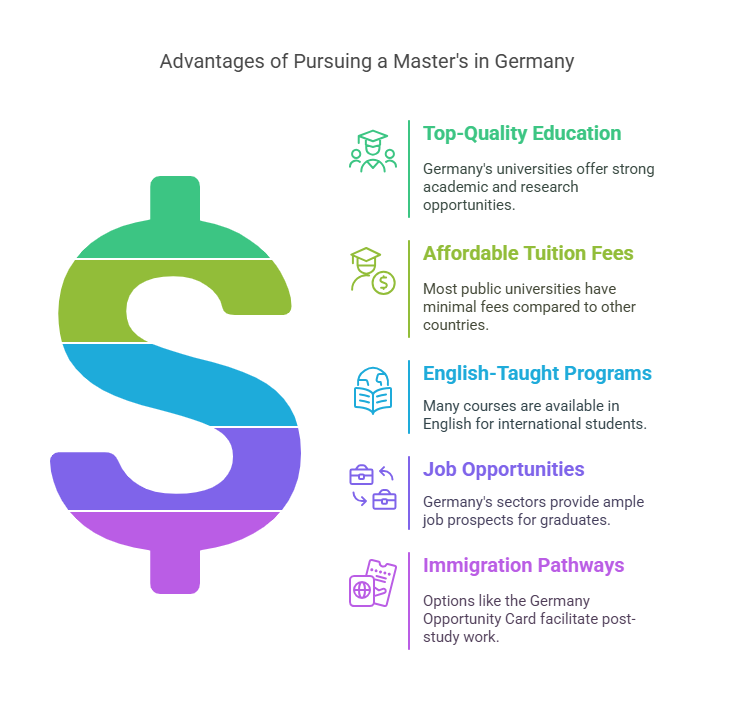
Here is a more detailed look at why to pursue a Masters in Germany:
- Top-Quality Education: Germany is home to top-class universities with strong academic reputation and research opportunities. Germany offers a wide range of courses in various fields, including engineering, sciences, arts and humanities.
- Affordable Tuition Fee: Germany offers the most affordable universities in the whole of Europe. Most of the public universities don’t charge tuition fee, only requiring a small semester fee for administration and other costs.
- English-Taught Programs: Most of the German universities offer courses in English, making it convenient for international students to study in Germany.
- Job Opportunities and Career Growth: Germany’s thriving manufacturing sector along with healthcare, IT and renewable energy sectors offer plenty of job prospects for students who completed their masters in Germany.
- Immigration Pathways: There are several pathways for international students to stay and work after completing their masters in Germany. The Germany opportunity card allows you to seek employment for up to 18 months if you have sufficient funds to support yourself during your job search. Also, students can apply for an EU Blue Card if they find a job from a recognized German employer.
Top Universities in Germany for MS
Here is a look at the top 10 universities in Germany, particularly in fields like engineering and technology, business and management, medicine, and arts and humanities, with their QS rankings and average fees per year:
|
Top Universities for Masters Program (Name) |
Universities QS World Rankings 2025 |
Average fee per year |
|
#28 |
€12,000 |
|
|
#59 |
No tuition fee |
|
|
#84 |
€3300 |
|
|
#99 |
No tuition fee |
|
|
#126 |
No tuition fee |
|
|
#97 |
No tuition fee |
|
|
University of Bonn |
#227 |
No tuition fee |
|
#102 |
€3400 |
|
|
#212 |
€2000 |
|
|
#147 |
No tuition fee |
Top 10 Universities for Engineering and Technology in Germany
The table below lists the top 10 universities for masters in engineering in Germany, their QS world rankings, and average fee per year:
|
Universities in Germany |
QS World Rankings 2025 |
Average fee per year |
|
Technical University of Munich (TUM) |
#28 |
€12,000 |
|
Technical University Berlin |
#147 |
No tuition fee |
|
Karlsruhe Institute of Technology |
#102 |
€3400 |
|
RWTH Aachen University |
#99 |
No tuition fee |
|
Dresden University of Technology |
#234 |
No tuition fee |
|
University of Stuttgart |
#314 |
€3000 |
|
Technical University of Darmstadt |
#241 |
No tuition fee |
|
Humboldt University |
#126 |
No tuition fee |
|
Ludwig Maximilian University of Munich (LMU) |
#59 |
No tuition fee |
|
University of Erlangen-Nuremberg |
#224 |
No tuition fee |
Top 10 Universities for Business and Management in Germany
The table below lists the top 10 universities for masters in business and management in Germany, their QS world rankings, and average fee per year:
|
Universities in Germany |
QS World Rankings 2025 |
Average fee per year |
|
Technical University of Munich (TUM) |
#28 |
€16,000 |
|
University of Mannheim |
#487 |
€45,000 |
|
WHU – Otto Beisheim School of Management |
NA |
€39,600 |
|
Ludwig Maximilian University of Munich (LMU) |
#59 |
No tuition fee |
|
Humboldt University |
#126 |
No tuition fee |
|
RWTH Aachen University |
#99 |
No tuition fee |
|
Free University of Berlin |
#97 |
No tuition fee |
|
Goethe University Frankfurt |
#309 |
€3200 |
|
University of Hamburg |
#191 |
No tuition fee |
|
University of Cologne |
#285 |
No tuition fee |
Top 10 Universities for Medicine in Germany
The table below lists the top 10 universities for masters in medicine in Germany, their QS world rankings, and average fee per year:
|
Universities in Germany |
QS World Rankings 2025 |
Average fee per year |
|
Heidelberg University |
#84 |
€3300 |
|
Ludwig Maximilian University of Munich (LMU) |
#59 |
No tuition fee |
|
Technical University of Munich (TUM) |
#28 |
€12,000 |
|
Charité – Universitätsmedizin Berlin |
NA |
€5000 |
|
University of Hamburg |
#191 |
No tuition fee |
|
Eberhard Karls University of Tübingen |
#222 |
€3400 |
|
University of Freiburg |
#212 |
€3400 |
|
Medizinische Hochschule Hannover |
NA |
No tuition fee |
|
University of Erlangen-Nuremberg |
#224 |
No tuition fee |
|
University of Cologne |
#285 |
No tuition fee |
Top 10 Universities for Arts and Humanities in Germany
The table below lists the top 10 universities for masters in arts and humanities in Germany, their QS world rankings, and average fee per year:
|
Universities in Germany |
QS World Rankings 2025 |
Average fee per year |
|
Humboldt University |
#126 |
No tuition fee |
|
Free University of Berlin |
#97 |
No tuition fee |
|
Ludwig Maximilian University of Munich (LMU) |
#59 |
No tuition fee |
|
Heidelberg University |
#84 |
€3300 |
|
Eberhard Karls University of Tübingen |
#222 |
€3400 |
|
Goethe University Frankfurt |
#309 |
€3200 |
|
University of Hamburg |
#191 |
No tuition fee |
|
University of Freiburg |
#212 |
€3400 |
|
University of Cologne |
#285 |
No tuition fee |
|
University of Gottingen |
#252 |
No tuition fee |
Top MS Specializations in Germany
Here is a table outlining the top 10 MS specializations in Germany, along with universities offering these courses, program duration, and approximate tuition fees:
| S.No | MS Specialization | Universities Offering the Course | Duration | Tuition Fee (EUR) |
|---|---|---|---|---|
| 1 | Mechanical Engineering | RWTH Aachen University, Technical University of Munich (TUM), Karlsruhe Institute of Technology (KIT) | 2 years | 3,000 – 15,000 |
| 2 | Automotive Engineering | Technical University of Munich (TUM), University of Stuttgart, RWTH Aachen University | 2 years | 12,000 – 13,000 |
| 3 | Computer Science | Technical University of Munich (TUM), RWTH Aachen University, Technical University of Berlin, University of Freiburg | 2 years | 0 – 20,000 |
| 4 | Electrical Engineering | Technical University of Munich (TUM), Karlsruhe Institute of Technology (KIT), University of Stuttgart | 2 years | 2,000 – 12,000 |
| 5 | Chemical Engineering | Technical University of Munich (TUM), University of Stuttgart, RWTH Aachen University | 2 years | 3,000 – 15,000 |
| 6 | Civil Engineering | Technical University of Munich (TUM), University of Stuttgart, RWTH Aachen University | 2 years | 0 – 13,000 |
| 7 | Industrial Engineering | RWTH Aachen University, Technical University of Munich (TUM), University of Stuttgart | 2 years | 0 – 13,000 |
| 8 | Aerospace Engineering | Technical University of Munich (TUM), University of Stuttgart, RWTH Aachen University | 2 years | 12,000 – 13,000 |
| 9 | Data Science | Technical University of Munich (TUM), University of Freiburg, RWTH Aachen University | 2 years | 4,000 – 15,000 |
| 10 | Environmental Engineering | Technical University of Berlin (TU Berlin), University of Stuttgart, RWTH Aachen University | 2 years | 3,000 – 12,000 |
Masters in Germany Cost Breakdown
Germany is a sought-after destination for students given that there are no or very low tuition fees, especially in German public universities. The section below outlines the total cost of studying master's in Germany, including semester fees (if applicable), living costs in major German cities, and other miscellaneous expenses.
Tuition fees for International Students
The tuition fees for international students vary based on whether the chosen university is public or private.
- Most public universities in Germany do not charge tuition fees.
- A small amount must be paid as a semester fee, which typically ranges from €250 to €450, depending on the university you have applied to.
- The semester fee includes transportation costs and student union charges.
- Certain public universities in Germany charge tuition fee which ranges from €4000 to €12,000
- Tuition fees for private universities range from €10,000 to €45,000. It varies based on the course you have opted for.
Living costs in major cities in Germany
The cost of living in German cities varies depending on where you reside. Cities like Munich, Berlin, Dortmund, and Frankfurt have different living expenses. Here is a look at the living expenses in major German cities:
Berlin
- It is one of the most affordable cities in Germany for students.
- Average monthly rent of €400 - €600
- Average monthly food expense of €150 - €250
- Transportation charges will be covered under the semester contribution.
- Estimated monthly living cost of €1000 - €1200
Munich
- Relatively expensive compared to Berlin
- Immense part-time job opportunities for students
- Average monthly rent of €600 - €1000
- Average monthly food expense of €250 - €400
- Estimated monthly living cost of €1600 - €2000
Frankfurt
- Relatively expensive since it’s the financial hub of Germany
- Average monthly rent of €500 - €700
- Average monthly food expense of €150 - €250
- Estimated monthly living cost of €1200 - €1400
Scholarships and Financial Aids
There are scholarships and financial aid available for international students to pursue master's in Germany, such as DAAD (German Academic Exchange Service), Deutschlandstipendium, and a few offered by private foundations like Heinrich Boll, Konrad-Adenauer, Friedrich-Ebert, Humboldt Research Fellowship, and Erasmus Mundus scholarship.
Masters in Germany for Indian Students
Masters in Germany is highly valued internationally, enhancing career prospects for Indians. After completing a master's degree in Germany, students can apply for post-study work visas or job-seeking visas to gain practical knowledge and potentially find the ideal employment that suits their profile.
Germany offers master's degrees in various fields for Indians, including engineering and technology, medicine, arts and humanities, and business
Admission Requirements for Masters in Germany
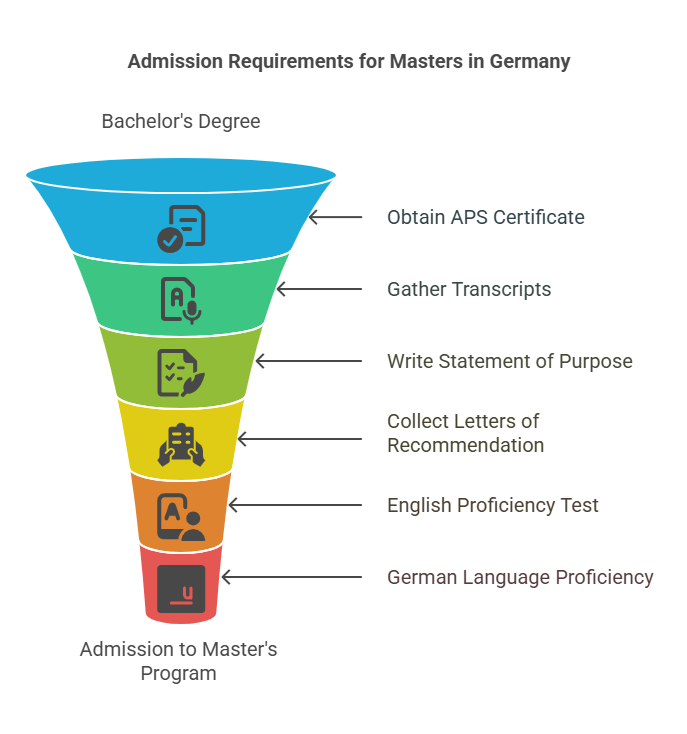
The admission requirements for masters in Germany for Indian students are given below:
- A bachelor’s degree or equivalent
- An APS certificate to verify the authenticity of educational documents
- Academic transcripts from your previous educational institutions
- Statement of Purpose (SOP) outlining your interest in studying in Germany
- Letters of Recommendation (LORs) if applicable
- English proficiency through IELTS or TOEFL tests
- German language proficiency for German-taught programs
Visa Requirements for Masters in Germany

The visa requirements for masters in Germany for Indian students are given below:
- Latest biometric photographs
- Letter of admission from a recognized German university
- Proof of funds to support yourself
- Educational qualification documents
- APS certificate, if applicable
- Proof of language proficiency in English ( German if applicable)
Steps to apply for Masters in Germany
The steps to apply for a masters program in Germany are as follows:
Step 1: Identify the program you want to do for your masters in Germany
Step 2: Check if you are eligible for the program
Step 3: Gather all relevant documents, such as transcripts, SOP, LORs, and other educational documents
Step 4: Apply for the program online and pay the application fee
Step 5: Wait for the acceptance letter from the university that you have applied
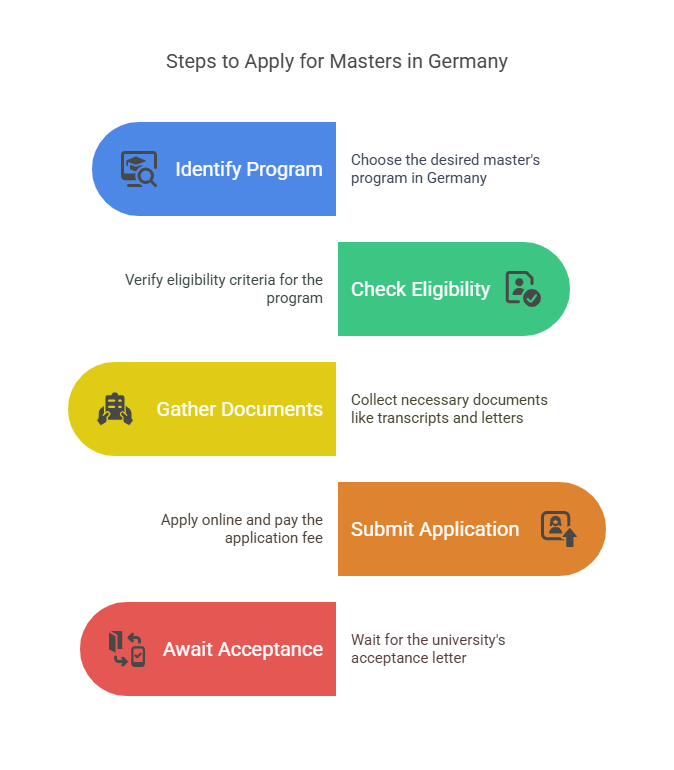
Job Opportunities after Masters in Germany
There is a massive demand for skilled labor in Germany, especially in the STEM fields. Key industries that offer job opportunities are automotive, healthcare, engineering, and technology, with an average annual salary range from €46,000 to €110,000, depending on the job role and experience. After you secure an employment in Germany, you may be eligible for PR after completing two years of employment.
The table below has the list of high-paying jobs in Germany along with the average annual salary range:
|
Occupation |
Average Annual Salary |
|
IT and Software |
€36,000 - €65,000 |
|
Healthcare |
€37,300 - €100,000 |
|
Sales and Marketing |
€35,000 - €85,800 |
|
Engineering |
€58,500 - €312,000 |
|
Accounting and Finance |
€41,600 - €249,600 |
|
Human Resource |
€31,200 - €61,500 |
|
Teaching |
€39,000 - €208,000 |
|
Hospitality and Travel |
€24,000 - €134,500 |
|
Construction and Maintenance |
€34,200 - €91,000 |
|
STEM |
€44,200 - €156,000 |
Also, read…
Germany Job Market in 2024-25
How can Y-Axis help you study in Germany?
Y-Axis provides end-to-end support for individuals who wish to do their masters in Germany. At Y-Axis, we offer the following:
- Y-Path to choose your ideal course
- Y-Axis Coaching Centre to boost your scores for IELTS, TOEFL, GRE and GMAT
- Visa guidance for Germany student visa
Guidance and assistance in writing unbiased SOPs and LORs for students

